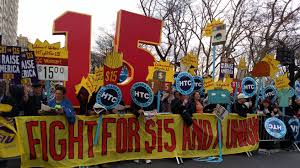
Courtney Brunson is a student at Harvard Law School and member of the Harvard Legal Aid Bureau.
The Congressional Budget Office released a report on Monday on the effects of the Raise the Wage Act of 2021. It concluded that the legislation’s aim to increase the federal minimum wage to $15 an hour by 2025 would increase raises for 27 million workers and lift 900,000 Americans above the poverty threshold. In addition, the cumulative pay of workers directly and potentially affected would increase, on net, by $333 billion by 2031. The CBO also noted, however, that employment would be reduced by 1.4 million during this time period with young, less educated people accounting for a disproportionate share of those reductions. Efforts to increase workers’ livable wage and compensation have received support by Democrats in Congress and President Joe Biden, while many Republicans have expressed concerns that such efforts could increase the country’s deficit and harm individual businesses.
Liberty Street Economics wrote yesterday about the disproportionately negative impact COVID-19 has had on the labor participation of Black Americans. Their analysis has indicated that Black labor participation fell more severely at the onset of the pandemic and has since recovered more slowly. As a result, though the years following the Great Recession had narrowed the long-standing Black-white participation gap, the pandemic has erased these gains. According to their report, the unemployment rate of Black workers during the pandemic has pushed the Black-white unemployment gap from 3 percentage points in February to 5.4 percentage points in August 2020. The National Women’s Law Center recently focused on the impact of COVID-19 to female workers’ employment by analyzing the most recent Bureau of Labor Statistics (BLS) monthly report, as covered by On Labor here. According to their report, all of the 87,000 jobs gained in the U.S. economy were held by women. However, 275,000 women have left the labor force altogether (either by no longer working or seeking employment). This is especially concerning, as the total number of women who have exited the labor force has reached 2.3 million since the start of the pandemic, which puts the female labor force participation at the rate it was in 1988. As efforts to help the country recover from the pandemic continue, these statistics indicates that policymakers should prioritize communities disproportionately impacted.
As the vaccine rollout continues throughout the country, Bloomberg Law reported yesterday on the results of the CDC’s Morbidity and Mortality Weekly Report, which surveyed 3,541 people in September and 2,033 individuals in December on whether they were certain or very likely to get a Covid-19 vaccine. The study concluded that only about half of U.S. adults surveyed said they would get the vaccine. Of those surveyed, younger adults, women, Black people, adults not living in cities, those with low education, those with low income, and those lacking health insurance were most likely to say they didn’t plan on getting a vaccine. Top concerns expressed by respondents included concerns about the side effects and safety of vaccines as well as the swift pace at which the vaccines were developed. Though a greater proportion of those surveyed said they would get the vaccine in December than September, the survey indicated that “more work needed to be done to address concerns about the vaccines after they were cleared for use.”
The latest of multiple professional athletes who have recently engaged in collective bargaining in the midst of the pandemic, the Major League Soccer (MLS) and players’ union (MLS Players Association, or MLSPA) successfully ratified amendments to their collective bargaining agreement before this week’s deadline. For context, the two sides formulated a five-year agreement last winter. However, the repercussions from the coronavirus pandemic required that both groups return to negotiations after players initially agreed to 7.5% salary cuts. Though the MLSPA declined to reveal the voting results, they did provide the following statement:
“MLS players have made incredible sacrifices and overcome considerable challenges in the past year to continue doing their jobs during a difficult time for all of us. We now move on to a 2021 season that we hope can reunite supporters and players in stadiums all across North America to enjoy and advance the game we all love.”





Daily News & Commentary
Start your day with our roundup of the latest labor developments. See all
April 19
Alabama and Louisiana advance anti-worker legislation; Mercedes workers in Alabama set election date; VW Chattanooga election concludes today.
April 18
Disneyland performers file petition for unionization and union elections begin at Volkswagen plant in Tennessee.
April 18
In today’s Tech@Work, a regulation-of-algorithms-in-hiring blitz: Mass. AG issues advisory clarifying how state laws apply to AI decisionmaking tools; and British union TUC launches campaign for new law to regulate the use of AI at work.
April 17
Southern governors oppose UAW organizing in their states; Florida bans local heat protections for workers; Google employees occupy company offices to protest contracts with the Israeli government
April 16
EEOC publishes final regulation implementing the Pregnant Workers Fairness Act, Volkswagen workers in Tennessee gear up for a union election, and the First Circuit revives the Whole Foods case over BLM masks.
April 15
The Supreme Court ruled in favor of bakery delivery drivers in an exemption from mandatory arbitration case; A Teamsters Local ends its 18-month strike by accepting settlement payments and agreeing to dissolve